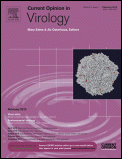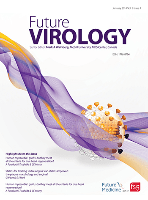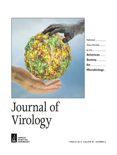
Frontiers in Virology
Scope & Guideline
Pioneering Discoveries in Viral Pathogenesis
Introduction
Aims and Scopes
- Viral Pathogenesis and Host Interactions:
Research focusing on how viruses interact with host cells, including mechanisms of infection, immune evasion strategies, and the impact of viral infections on host physiology. - Epidemiology and Surveillance of Viral Diseases:
Studies that analyze the spread and prevalence of viral infections, including novel and re-emerging viruses, and their implications for public health. - Molecular Virology and Viral Evolution:
Investigations into the molecular biology of viruses, including genetic diversity, evolutionary dynamics, and the impact of mutations on viral behavior and pathogenicity. - Innovative Therapeutics and Vaccine Development:
Research aimed at developing new antiviral drugs and vaccines, including studies on vaccine efficacy, immune responses, and therapeutic strategies against viral infections. - Bioinformatics and Computational Virology:
Application of computational methods and bioinformatics tools to analyze viral genomes, predict viral evolution, and understand host-virus interactions.
Trending and Emerging
- COVID-19 and SARS-CoV-2 Research:
The pandemic has led to an explosion of studies related to SARS-CoV-2, focusing on its biology, epidemiology, vaccine development, and long-term effects, showcasing the urgency and relevance of this field. - Viral Evolution and Variant Characterization:
There is an increasing emphasis on studying viral mutations and their implications for transmission and virulence, particularly in the context of emerging variants of concern. - Host Immune Response and Viral Interactions:
Research is increasingly focusing on the host's immune response to viral infections, including the mechanisms of immune evasion and the role of host factors in viral pathogenesis. - Translational Virology and Public Health:
A growing body of work is dedicated to translating virology research into public health strategies, addressing the challenges posed by emerging and re-emerging viral threats. - Interdisciplinary Approaches in Virology:
There is a notable trend towards integrating virology with other scientific disciplines, such as genomics, bioinformatics, and environmental science, to provide a more comprehensive understanding of viral infections.
Declining or Waning
- Traditional Virology Techniques:
There is a noticeable decline in publications focusing solely on classical virology techniques, such as plaque assays and basic viral isolation methods, as the field increasingly embraces molecular and computational approaches. - Localized Studies of Viral Infections:
Research that focuses exclusively on localized outbreaks or infections without broader implications or connections to global health trends is becoming less common, likely due to the increasing emphasis on global epidemiology. - Animal Models for Viral Research:
While still important, the reliance on certain animal models for studying viral infections appears to be decreasing as alternative methods, such as humanized models and in vitro systems, gain favor.
Similar Journals

REVIEWS IN MEDICAL VIROLOGY
Catalyzing Research in Antiviral TherapeuticsREVIEWS IN MEDICAL VIROLOGY is a premier academic journal published by Wiley, dedicated to advancing the field of virology and infectious diseases. Established in 1991, this journal has gained a reputable standing, holding a Q1 ranking in both Infectious Diseases and Virology as of 2023, with impressive Scopus rankings placing it at #17 out of 344 in the realm of Medicine - Infectious Diseases, and #8 out of 80 in Immunology and Microbiology - Virology. This reflects its substantial impact factor and contribution to ongoing research and scholarship. While it is not an Open Access publication, REVIEWS IN MEDICAL VIROLOGY offers vital insights and comprehensive reviews that cater to a diverse audience including researchers, healthcare professionals, and students pursuing knowledge in medical virology. The journal serves as a vital resource for understanding the complexities of viral pathogens and the evolving landscape of antiviral therapeutics, making it an essential read for those poised at the forefront of infectious disease research.

Current Opinion in Virology
Championing Comprehensive Reviews in VirologyCurrent Opinion in Virology, published by Elsevier Science Ltd, is a premier journal dedicated to advancing knowledge in the dynamic field of virology. Established as a respected source of comprehensive reviews and critical evaluations, this journal boasts an impressive impact factor and has achieved a distinguished Q1 category ranking for virology, signifying its pivotal role in the academic community. Serving researchers, professionals, and students alike, Current Opinion in Virology presents insightful contributions that delve into the latest developments, emerging trends, and pivotal challenges facing virology today. With its Scopus ranking placing it in the top 15% of its field, the journal provides unparalleled access to cutting-edge research that informs both basic and applied aspects of virology. Although not an open-access journal, it offers options for subscriptions that ensure accessibility to critical content. As the field continuously evolves, Current Opinion in Virology remains at the forefront, bridging the gap between research and clinical application, making it an essential resource for all in the virology community.

Future Virology
Advancing the Frontiers of Viral ResearchFuture Virology, published by Future Medicine Ltd, is an essential journal dedicated to advancing the understanding of virology in the contemporary scientific landscape. With an ISSN of 1746-0794 and an E-ISSN of 1746-0808, this journal serves as a platform for researchers and practitioners in the field to publish high-quality, peer-reviewed articles that explore novel discoveries, innovative therapeutic strategies, and the implications of viral research on global health. Operating from the United Kingdom and maintaining a commitment to rigorous scientific inquiry, Future Virology is categorized in the Q4 Quartile for Virology according to the latest Scopus rankings, with a position of Rank #48/80 and a percentile of 40th in the Virology category. Although it currently does not offer open access, the journal strives to disseminate critical insights that benefit a wide range of professionals, researchers, and students engaged in virology and related fields. By bridging the gap between basic research and practical applications, Future Virology plays a crucial role in fostering innovation and collaboration in the ever-evolving virology landscape.

Virology Journal
Advancing the frontiers of virology research.Virology Journal, published by BMC, stands as a prominent open-access platform since 2004, dedicated to advancing the field of virology and infectious diseases. With its E-ISSN: 1743-422X, this journal is based in the United Kingdom and strives to disseminate high-quality research that enhances our understanding of viral pathogens and their interactions with hosts. Recognized with a Q1 classification in the category of Infectious Diseases and a Q2 in Virology for 2023, Virology Journal holds significant standing in the academic community, ranking #82/344 in Medicine - Infectious Diseases and #26/80 in Immunology and Microbiology - Virology. Its commitment to open access ensures that cutting-edge research is freely available to researchers, professionals, and students worldwide, fostering collaboration and innovation in the fight against viral diseases. The journal aims to publish original research articles, reviews, and commentaries that will stimulate discourse and spark new ideas within the virology community.

VIRAL IMMUNOLOGY
Unraveling the complexities of viral interactions with immune systems.Viral Immunology, published by Mary Ann Liebert, Inc, stands as a prominent journal dedicated to advancing the understanding of the interplay between viral infections and host immune responses. With a strong focus on immunology, molecular medicine, and virology, the journal provides a platform for the dissemination of high-quality research findings and innovative methodologies that could shape the future of these critical fields. Although it currently holds a Q3 rating across its relevant categories and a respectable ranking within the Scopus database, Viral Immunology continues to strive for excellence with a commitment to publishing influential research that informs both academic and clinical practices. The journal accepts submissions in various formats—original research, reviews, and commentaries—catering to a diverse readership that includes researchers, professionals, and students engaged in the biological and medical sciences. Readers can anticipate insightful articles that address urgent challenges in immunological responses to viral infections, paving the way for new therapeutic strategies and public health initiatives.

VIRUS GENES
Exploring the Genetic Blueprint of VirusesVIRUS GENES is an esteemed journal published by Springer, dedicated to advancing our understanding of virology and its related fields, including genetics, molecular biology, and immunology. With a publication history that spans from 1987 to 2024, this journal provides researchers and professionals with a platform to disseminate high-quality, peer-reviewed articles that explore the intricacies of viral genetics and their implications in health and disease. With an impact factor placing it in the Q3 quartile across multiple categories in 2023, including Genetics and Virology, VIRUS GENES serves as a crucial resource for academics seeking to stay at the forefront of viral research. Its commitment to showcasing innovative research makes it an invaluable asset for students and professionals aiming to deepen their knowledge in the rapidly evolving landscape of virology. Although currently not offering Open Access, the journal ensures wide accessibility through institutional subscriptions, thereby playing a vital role in the collaboration between scientists globally.

JOURNAL OF CLINICAL VIROLOGY
Advancing the Frontiers of Viral ResearchJournal of Clinical Virology, published by Elsevier, stands at the forefront of virology research, focusing on the clinical implications of viral diseases. With an impressive impact factor representative of its Q1 categorization in both Infectious Diseases and Virology, this journal is essential for researchers and healthcare professionals aiming to keep pace with evolving knowledge and treatments in virology. Since its inception in 1998, it has provided a vital platform for the dissemination of significant breakthroughs, now continuing through to 2024. The journal boasts competitive Scopus ranks, placing it in the 95th percentile for Infectious Diseases and the 91st percentile for Virology. Scholars can benefit from its selective Open Access options, promoting widespread access to cutting-edge research. With an ever-increasing demand for innovative solutions to viral infections, Journal of Clinical Virology remains dedicated to fostering advancements in the field, making it a key resource for anyone invested in virology and infectious disease management.

Advances in Virology
Unleashing Innovation in Viral ScienceAdvances in Virology, an esteemed journal published by HINDAWI LTD, serves as a pivotal platform for cutting-edge research in the field of virology and infectious diseases. With its ISSN 1687-8639 and E-ISSN 1687-8647, the journal has been a significant contributor to the scientific community since its initiation as an Open Access resource in 2009, allowing researchers from around the globe to access groundbreaking findings without barriers. Operating out of the United States and recognized for its commitment to high-quality research, the journal's relevance is underscored by its ranking in the Q3 category for Infectious Diseases and Q4 for Virology as of 2023. The time frame of publications spans from 2009 to 2024, reflecting a continuous commitment to exploring the evolving landscape of virology. This journal not only promotes the dissemination of novel insights and methodologies but also fosters collaboration and innovation within the scientific community, making it an invaluable resource for researchers, professionals, and students alike.

Virus Evolution
Empowering virology through open access knowledge.Virus Evolution is a premier open access journal published by Oxford University Press, dedicated to advancing the understanding of viral dynamics and evolutionary trends. Established in 2015, it has quickly ascended to a leading position in the fields of Microbiology and Virology, achieving a remarkable Q1 ranking in both categories for 2023. With its impactful research output, it ranks #27 out of 182 in Microbiology and #15 out of 80 in Virology, placing it in the top percentiles of the Scopus rankings. The journal serves as a vital resource for researchers, professionals, and students, providing a platform for the dissemination of innovative research that explores the genetic and ecological aspects of viruses. By embracing an open access model, Virus Evolution ensures that its high-quality content is accessible to a global audience, fostering collaboration and enhancing the impact of virology research worldwide.

Journal of Virology
Innovating Solutions for Viral ChallengesJournal of Virology is a premier scholarly journal dedicated to advancing the field of virology, focusing on the molecular mechanisms of virus-host interactions, viral pathogenesis, and the latest therapeutic and vaccine developments. Published by the American Society for Microbiology, this esteemed journal has been a cornerstone for researchers since its inception in 1967, providing a platform for high-quality, peer-reviewed research. With a commendable impact factor indicative of its relevance and influence, the journal is categorized in the top quartile (Q1) for Virology, Microbiology, and Insect Science, reflecting its significance in these fields. Researchers can access a wealth of studies and findings that shape our understanding of viruses and their interactions with hosts, highlighting its role in both basic and applied sciences. Positioned in the United States, the Journal of Virology serves a global audience, ensuring that cutting-edge discoveries reach professionals, students, and academics alike. Join the conversation as we explore the complexities of virology and its implications for human health and disease.